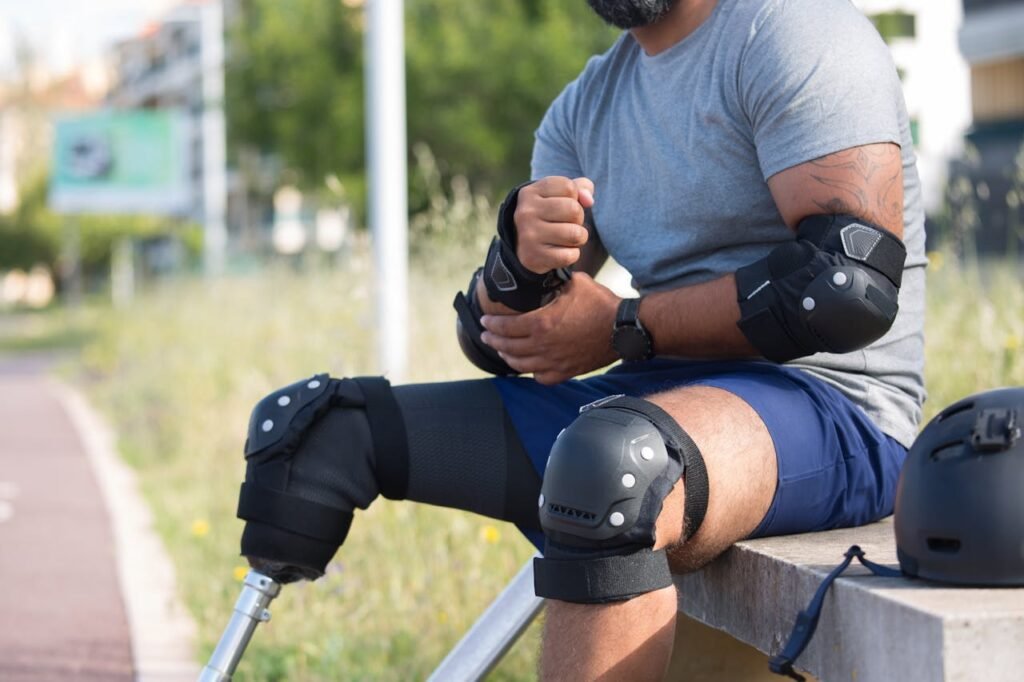A prosthetic trial fit is an exciting and meaningful step in your journey toward greater independence. It is the first time you will feel how a device interacts with your body, how it supports your movement, and how it fits into your daily life. While the fitting itself is guided by your prosthetist, one detail often overlooked is what you choose to wear on that day.
The right clothing makes a big difference. Soft sleeves protect your skin, proper liners help with comfort, and the right shoes keep your balance steady. What you wear is not about style—it is about safety, comfort, and making the trial fit as smooth as possible.
At RoboBionics, we remind every user that clothing is part of the fitting process. It affects how the device grips, how much freedom you feel, and even how confident you are during those first movements. Simple choices on the morning of your appointment can set the tone for a successful and comfortable trial.
The Role of Sleeves in a Trial Fit
Why sleeves matter
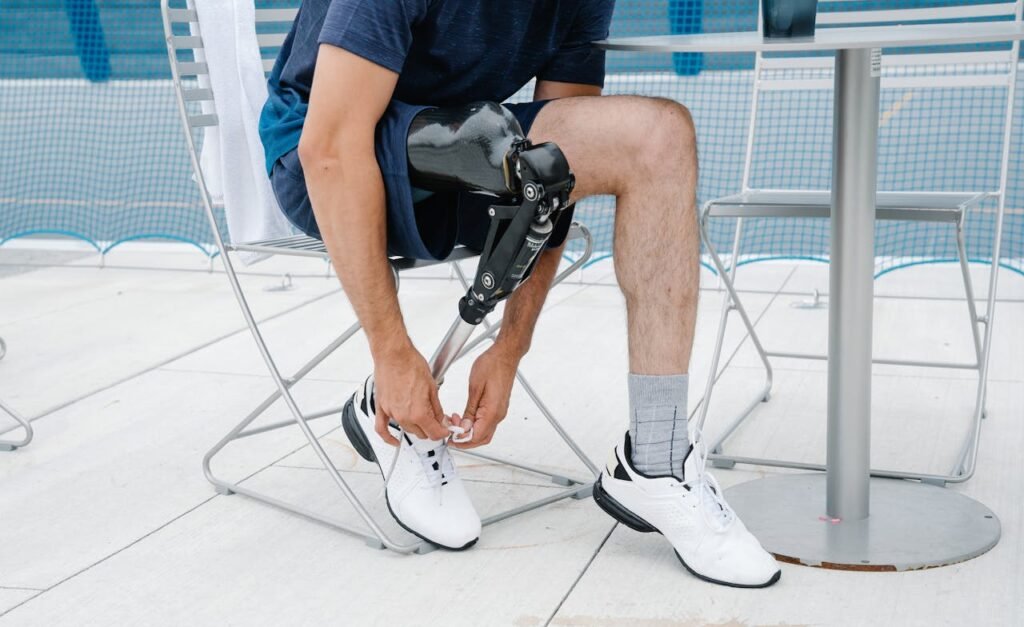
When you walk into a trial fitting, what covers your limb makes a big difference. Sleeves are not just fabric; they are the layer between your skin and the socket. They can protect the skin from rubbing, absorb sweat, and reduce the chance of irritation.
A good sleeve also helps create smoother contact between your limb and the device. If the sleeve fits poorly, it may bunch up or wrinkle, which can cause pressure points. This is why choosing the right sleeve is more than comfort—it is safety.
Types of sleeves used
There are different kinds of sleeves, and each serves its own purpose. Cotton sleeves are soft and breathable, making them a good choice for warm weather. They are gentle on sensitive skin and easy to wash.
Some sleeves are made of special blends with elastic fibers that hug the limb more tightly. These give extra suspension and can help keep the prosthesis stable. For children, softer materials are usually chosen to avoid any harsh pressure.
How to prepare your sleeve
Before your trial fit, make sure your sleeve is freshly washed and completely dry. Damp sleeves can cause slipping or discomfort. Avoid using fabric softeners, as they may leave residues that irritate the skin.
It is also wise to bring an extra sleeve in case of sweat or unexpected wear during the session. Having a clean backup ensures the trial continues without interruption.
Preparing the Skin for a Sleeve
Cleaning the limb
Your skin should always be clean before you put on a sleeve. A gentle wash with mild soap and warm water removes oils, sweat, and dust. Make sure to dry the skin carefully, as moisture can cause friction and rashes inside the sleeve.
If your skin tends to dry out, use a mild, fragrance-free moisturizer the night before your fitting. By morning, your skin will feel soft and ready, without being greasy.
Avoiding irritation
If you have cuts, rashes, or open wounds, tell your clinician before the trial fit begins. These areas need protection, and sometimes the trial may be delayed until the skin heals. Covering wounds with sleeves is not safe, as it may worsen the injury.
For sensitive skin, breathable cotton sleeves are usually best. Some people also use thin liners under the sleeve for extra comfort. Always consult with your prosthetist about what works for your limb.
Checking fit regularly
During the trial, the clinician will ask how the sleeve feels. If it feels too tight, itchy, or folded inside the socket, speak up right away. It is better to adjust early than to risk irritation. Comfort is not a luxury—it is a requirement for long-term use.
Why Liners Are Essential
The bridge between skin and socket
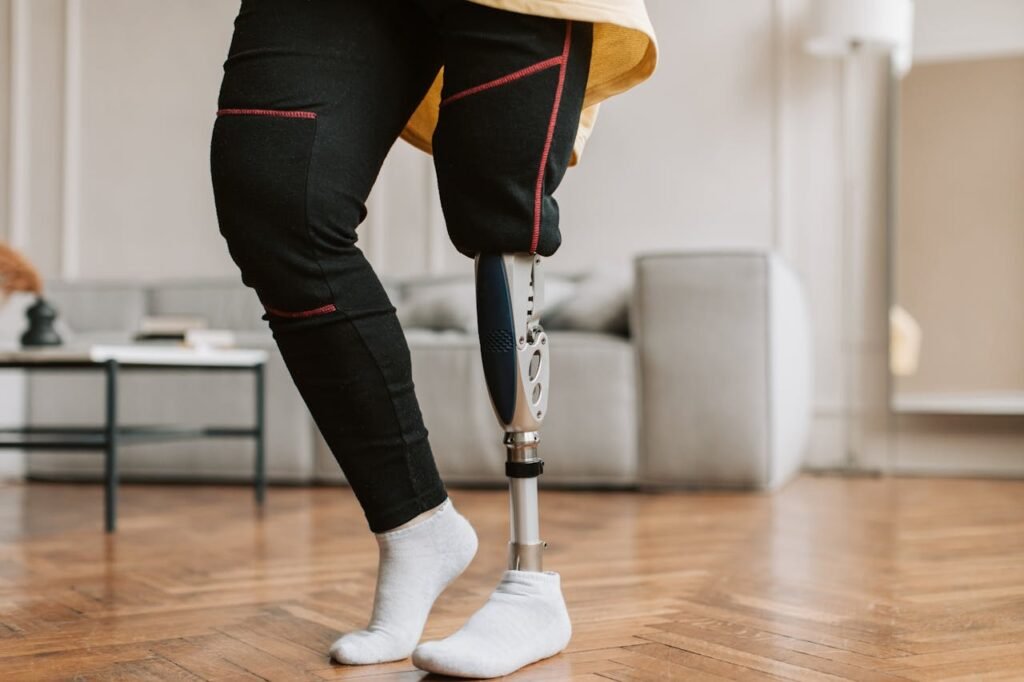
Liners are often described as the bridge between your limb and the prosthesis. They cushion the skin, distribute pressure, and improve suspension. Without liners, the socket may feel harsh, and the skin may be at higher risk of blisters or rubbing.
Modern liners are designed to be soft, flexible, and durable. They move with your limb and reduce the strain during daily activities. For new users, liners are especially important because the skin is still adjusting to the contact.
Choosing the right liner
There are silicone liners, gel liners, and fabric-based liners. Silicone liners are firm and provide strong grip. Gel liners feel softer and are better for sensitive skin. Fabric-lined options combine comfort with easy cleaning.
Your prosthetist will guide you in choosing the type of liner that matches your limb and lifestyle. For example, active users may need more durable liners, while children may need softer, more flexible ones.
Hygiene with liners
A liner must always be kept clean. Sweat and bacteria can collect inside quickly. Daily washing with mild soap and drying in open air is essential. Never use hot water, as it can damage the material.
For your trial fitting, bring a freshly cleaned liner. If possible, carry a spare. A clean liner not only protects your skin but also helps the prosthetist get accurate results from the trial.
The Importance of Shoes in a Trial Fit
Why shoes matter more than most think
When preparing for a prosthetic trial fit, many people focus on sleeves and liners but forget about shoes. Shoes are just as important because they affect balance, gait, and overall posture during the session. The type of shoe you wear can change how the prosthesis feels, especially for leg and foot fittings.
If the shoe is too soft or unstable, it may cause the device to shift awkwardly. If it is too hard or high, it may change the way your body distributes weight. This is why clinicians often ask users to bring a pair of sturdy, everyday shoes that they plan to wear regularly with their prosthesis.
Choosing the right pair
The best shoes for a trial fitting are those that are supportive, balanced, and comfortable. A flat sole with a firm base gives the most stability. Running shoes with heavy cushioning can sometimes create uneven pressure, while sandals or slippers may slip easily and make walking unsafe.
It is also recommended to use shoes of equal height on both sides. Even a small difference can affect balance and strain the hips or back. For children, shoes with adjustable straps or Velcro are often better than laces, as they are easier to manage during repeated trials.
Consistency is key
Wearing different shoes for each fitting may lead to confusing results. If you walk in one pair of shoes today and a different type tomorrow, the prosthetist may struggle to adjust the prosthesis accurately. Consistency helps the clinician make precise adjustments, which leads to a better final fit.
Bringing the same pair of shoes to every appointment ensures continuity and makes the fitting process smoother. Later, once the device is fully fitted, the user can explore other shoe options under the guidance of the prosthetist.
How Clothing Affects the Fitting Process
Loose versus tight clothing
Clothing plays a larger role than most people realize. Loose clothing may get in the way of sensors, straps, or socket placement. Tight clothing, on the other hand, may create unnecessary pressure points under the prosthesis.
For upper-limb users, short sleeves or sleeveless tops are usually recommended. This gives the prosthetist easy access to the limb and ensures that nothing interferes with the device. For lower-limb users, comfortable shorts or trousers that can be rolled up work best.
Material of clothing
Cotton is often the best choice for trial fittings. It is soft, breathable, and does not irritate the skin. Synthetic fabrics may trap sweat and cause heat build-up under the prosthesis. For children, lightweight cotton clothes make the experience easier and less stressful.
Parents are advised to avoid dressing children in bulky layers during a fitting. Thin, breathable clothing makes the session smoother and helps the clinician observe movements clearly.
Practicality during testing
During a trial fit, you may be asked to perform basic tasks like walking, lifting, or bending. Clothing that restricts movement makes these tests harder. Flexible, comfortable clothes that allow free motion are ideal.
It is also important to consider modesty and comfort, especially in a clinic environment. Wearing clothing that makes the user feel secure and relaxed creates a positive experience.
Practical Preparation Tips for the Day
Preparing the body

On the morning of your trial fit, keep routines simple. Wash the limb thoroughly with mild soap, dry it completely, and avoid heavy creams or oils. These can make sleeves or liners slippery and reduce the effectiveness of sensors.
Eat a light meal before heading to the clinic. An empty stomach may cause fatigue, while heavy meals can make you sluggish. Being alert and comfortable during the fitting helps you respond better to instructions.
What to pack
It is wise to pack a small bag with essentials. This may include an extra sleeve, a clean liner, a towel for wiping sweat, and your chosen pair of shoes. If you are a parent accompanying a child, you may also bring their favorite toy or snack to keep them relaxed.
Carrying a water bottle helps too, as fittings can sometimes take longer than expected. Staying hydrated keeps the body fresh and reduces discomfort.
Preparing the mind
A trial fitting is both a physical and emotional experience. It is natural to feel nervous, especially if it is your first time. Taking a few deep breaths before the session begins can calm the mind.
It also helps to set realistic expectations. Remember, the trial is not about perfection. It is about testing, adjusting, and learning. By walking in with patience and an open mindset, you create a smoother experience for yourself and your prosthetist.
Special Considerations for Children
Comfort comes first
When children come in for a trial fitting, their comfort is the highest priority. Kids often feel nervous about new environments, so what they wear can make the process easier or harder. Soft cotton clothes, short sleeves, and slip-on shoes reduce fuss and allow the prosthetist to focus on fitting.
Children have sensitive skin that reacts quickly to friction or heat. Thin cotton sleeves and lightweight liners protect them without adding bulk. Parents should always check that sleeves are snug but not tight, since anything too restrictive may cause discomfort and make the child resist wearing the prosthesis.
Clothing that feels familiar
For children, familiar clothes can reduce anxiety. Parents are encouraged to dress their child in clothes they already like wearing. A favorite t-shirt or pair of shoes can make the fitting session feel less intimidating. This small step helps build trust and keeps the child calm during the trial.
Practicality during play
Most pediatric trial fittings include playful activities—stacking blocks, tossing a ball, or drawing. Clothing should allow free movement for these tasks. Stretchable shorts or leggings make it easier for lower-limb fittings, while sleeveless tops are useful for upper-limb fittings.
Children may also sweat more during play, so carrying an extra sleeve or shirt is wise. A quick change keeps the child fresh and prevents irritation from damp fabric.
Dressing for India’s Hot and Humid Climate
Managing sweat
India’s warm weather adds unique challenges to trial fittings. Heat causes sweat to build up inside sockets and liners, making the skin slippery and prone to rashes. Wearing breathable cotton sleeves and loose clothing helps reduce moisture. For leg fittings, moisture-wicking socks are often recommended.
Families can also pack a small towel to wipe sweat during breaks. Allowing the limb to air out for a few minutes between tasks prevents overheating. If sweat is ignored, it may cause fungal infections, especially in humid regions.
Choosing the right shoes for weather
Rainy seasons in India bring extra difficulties. Wet shoes can make walking unsafe during fittings, so parents should ensure children come with dry, sturdy footwear. For adults, shoes with strong soles and good grip are best, especially if trial activities include walking on different surfaces.
During summers, sandals may seem tempting, but they are not ideal for trial fits. They lack stability and can cause slipping. Closed shoes with breathable material strike the right balance between comfort and safety.
Avoiding skin products before fittings
In hot weather, many people apply talcum powders or cooling oils to reduce sweating. While these may feel refreshing, they can create residue inside sleeves or liners. This residue interferes with grip and can cause skin irritation. Before a trial fit, it is best to avoid these products and rely on simple cleaning and drying routines.
Balancing Comfort with Safety
Comfort for the skin
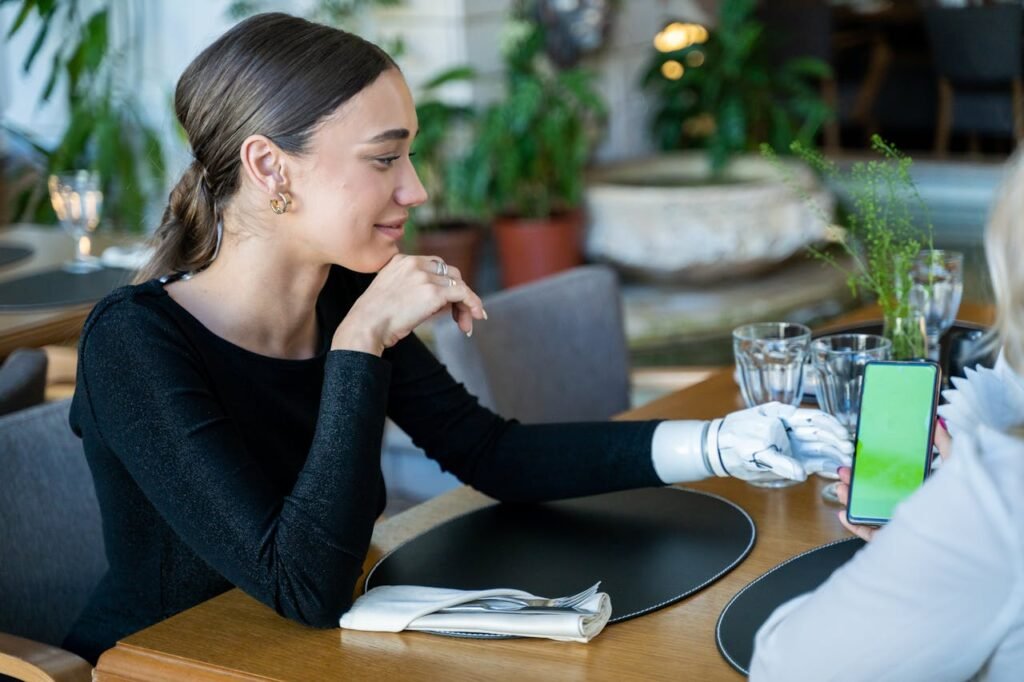
The first rule of comfort is that nothing should rub or pinch. Sleeves should sit smoothly against the skin without wrinkles. Liners should be the right size—not too loose and not too tight. Even shoes should feel balanced, supporting natural posture without pressing too hard on one side.
Clinicians often ask users to describe any discomfort immediately. Even a small pressure point can become painful after long use. Comfort at the trial stage prevents bigger problems with the final prosthesis.
Safety for daily activities
Trial fittings are designed to mimic daily life. You may be asked to walk, lift objects, or sit and stand several times. Comfortable clothing and proper shoes make these activities safe. If trousers are too long, they may cause tripping. If sleeves are too thick, they may interfere with socket grip. Safety is maintained by keeping clothing practical and fitted to the activity.
Emotional comfort
Safety is not only physical but emotional. Wearing clothes that make you feel at ease helps you focus on the fitting rather than worrying about how you look. For children, this may mean wearing a favorite cartoon shirt. For adults, it may mean choosing simple, non-restrictive clothing that feels natural.
Confidence grows when you feel safe and comfortable at the same time. This balance is the key to making the trial fit a positive experience rather than a stressful one.
Preparing for Repeat Fittings
Why repeat fittings are necessary
A single trial fit rarely gives the final answer. Most users, whether children or adults, go through several fittings before reaching the perfect match. Each session fine-tunes comfort, stability, and function. Clothing choices should remain consistent across these visits, so adjustments are based on the device and not on changes in what you wore.
Wearing the same type of sleeve, liner, and shoe across sessions makes it easier for the clinician to track progress. If you switch from a tight pair of jeans one day to loose shorts another, the feedback may vary and confuse the process. Consistency is not just a guideline—it is a vital part of the journey.
Keeping clothing ready
Families and individuals often create a “fitting kit” that they keep aside for every appointment. This kit includes a clean cotton sleeve, a fresh liner, and the same pair of shoes. By keeping these items dedicated to fittings, you avoid last-minute stress and ensure reliability each time.
Over time, this kit also creates a sense of ritual. Preparing it before each visit signals to the user—especially children—that the fitting is an important step, much like packing for school or work.
Adapting as you progress
As fittings move closer to the final device, clothing may need to change slightly. For example, once sensors are added, sleeveless tops may be more practical. Or when walking tests become longer, lighter athletic clothing may help with flexibility. The clinician guides these changes, making sure comfort and safety remain the priority.
Tips for Adults Versus Children
Adults and practicality
Adults often come to fittings directly from work or other responsibilities. They may choose clothing that looks professional but feels restrictive. For trial fits, practicality must come first. Trousers that roll up easily, breathable shirts, and sturdy shoes make the process smoother.
Adults may also need to think about sweat management during long sessions. Carrying an extra cotton shirt, sleeve, or pair of socks prevents discomfort when testing movements repeatedly. Adults tend to push through discomfort silently, but speaking up about even minor irritation is important for long-term success.
Children and playfulness
Children, on the other hand, learn best through play. Their clothing should support easy movement for playful activities. Flexible shorts, leggings, or tracksuits are better than stiff jeans. For upper-limb fittings, sleeveless tops or t-shirts give space for free arm movement.
Parents should also prepare children with extra clothing in case of spills, sweat, or accidents. A second pair of shoes can be useful too, especially if outdoor play is part of the trial. Since children can be sensitive, ensuring that their clothes feel soft and familiar makes the experience enjoyable instead of stressful.
Emotional differences
Adults often worry about technical details and costs, while children focus on comfort and fun. This means the role of clothing differs too. For adults, clothing supports practical testing. For children, clothing shapes their emotional response. A cheerful, comfortable outfit can help a child see the prosthesis as a friendly helper rather than a medical tool.
Footwear Considerations for Different Prostheses
Upper-limb prosthesis users
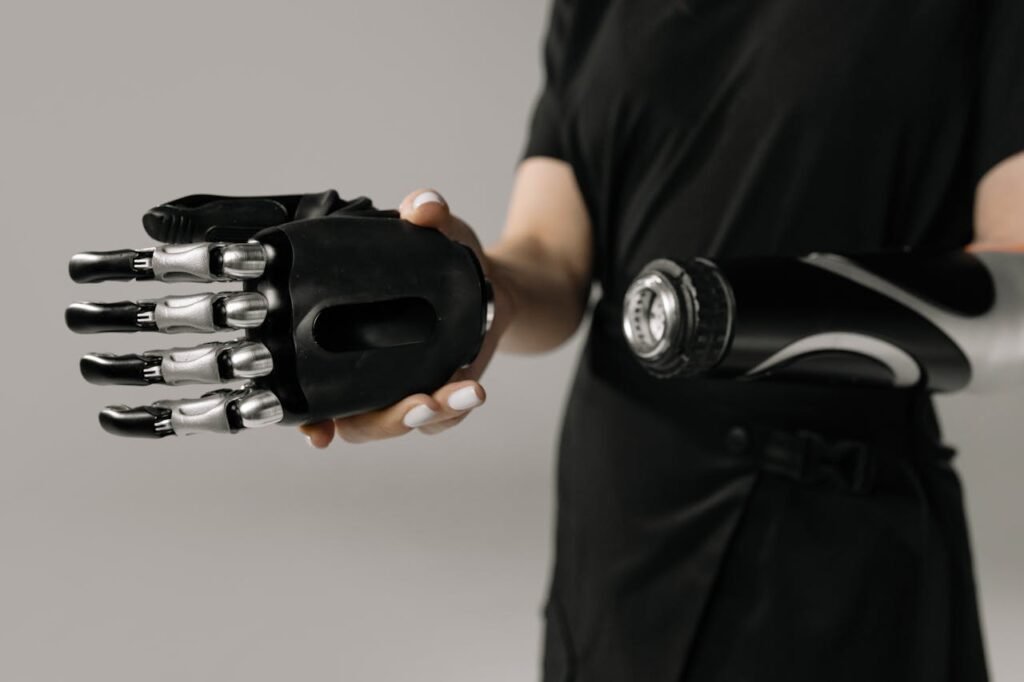
For users of upper-limb prostheses, shoes may seem less important. Yet they play a quiet but essential role. A strong and balanced shoe provides stability during tasks like lifting, carrying, or using both hands together. Poor footwear may shift balance and create strain on the back or hips.
Lower-limb prosthesis users
For leg prostheses, shoes are critical. The wrong shoe can alter alignment, create uneven pressure, or make walking unsafe. Flat, supportive shoes with firm soles are usually best. High heels, unstable sandals, or overly cushioned running shoes should be avoided, especially in early fittings.
Clinicians often recommend users bring the shoes they wear most often. If a person wears formal shoes daily, the trial should be done in those. If a child wears school shoes most of the time, those should be brought along. This way, the prosthesis is adjusted for real-life conditions rather than just for the clinic.
Children and footwear choices
Children may resist wearing closed shoes in hot weather. Parents should explain that shoes are part of their “helper hand” or “strong leg” process. Allowing them to choose the color or design of supportive shoes gives them a sense of control and pride. This small choice can encourage regular use and reduce resistance.
Weather and cultural footwear
In many Indian homes, people prefer sandals or slippers. While these may be fine indoors, they are not safe for fittings. Clinics advise families to keep at least one pair of strong, enclosed shoes dedicated to prosthetic use. This balance respects cultural practices while ensuring safety during fittings.
Conclusion with Actionable Takeaways
Dress for comfort and clarity
What you wear to a prosthetic trial fitting shapes the entire experience. Sleeves protect your skin, liners cushion and stabilize, and shoes ground your balance. Clothing should be light, breathable, and easy to move in. The goal is not style but safety and comfort.
Consistency is key
Bringing the same clothing, shoes, and accessories to every fitting session ensures accurate adjustments. A simple “fitting kit” prepared at home helps reduce stress and creates continuity. Consistency allows the prosthetist to focus fully on refining the device rather than adjusting for different outfits each time.
Respect climate and lifestyle
In India’s hot, humid weather, breathable cotton clothes and sweat management are critical. Sturdy shoes prevent slipping, and light sleeves protect sensitive skin. Parents and adults alike should prepare extras—sleeves, socks, shirts—to handle sweat and play.
Balance safety with confidence
The right clothing not only protects the skin but also gives emotional comfort. Children feel braver when they wear familiar clothes. Adults feel more confident when they are comfortable and secure. This balance of safety and confidence makes trial fittings positive milestones instead of stressful tests.
Your next step
When you book your prosthetic trial fitting, prepare not just mentally but physically. Pack your clean sleeve, liner, and shoes. Choose breathable clothes. Carry a small kit with towels, water, and spares. These simple steps turn a fitting session into a smooth, safe, and empowering experience.
At RoboBionics, we remind every user that what you wear is part of your success. The right choices protect your skin, steady your balance, and give you confidence. With preparation, every trial fit becomes not just a test, but a step closer to independence and dignity.



